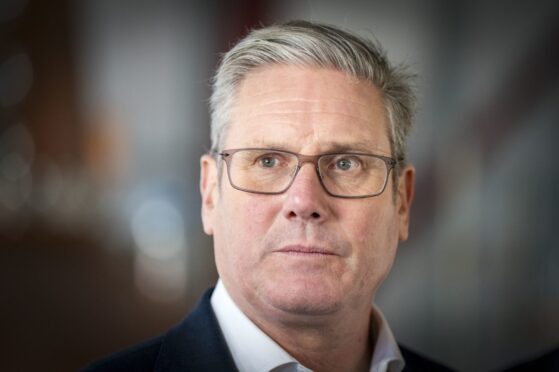
Funding proposals for Labour’s flagship election pledge of a new state-owned investment company do not make sense and could risk a permanent exodus from the UK’s energy sector, the country’s leading trade body has warned.
Jenny Stanning, external relations director of Offshore Energies UK (OEUK), said it is not logical to penalise firms to help set up GB Energy and then ask those same businesses to back it with direct investment.
UK Labour leader Sir Keir Starmer has made the project a central tenant of his pitch to Scottish voters, with a pledge to create 53,000 new clean energy jobs.
Starmer says it is not an energy company and would instead act as an “investment vehicle” for the private sector.
Labour plans to hand GB Energy £8.3 billion over the next five years funded through a windfall tax on the profits of oil and gas giants.
UK could be forced to ‘buy in’ transition
But speaking exclusively to The Sunday Post, Stanning said an extension to the tax already imposed on businesses will shake investor confidence and make it harder for the UK to compete in the “global race for capital”.
She warned this could push companies to look elsewhere and leave the UK in the position of having to “buy in” its transition to renewable energies.
Stanning said the UK will need a pipeline of projects to see through a just transition but if companies cannot see their long-term future here, they will be drawn overseas and the sector will be permanently damaged.
Asked if Labour’s plan makes sense, she added: “No, not really.”
Stanning said it is “absolutely essential” the next government makes the UK a more attractive place for energy companies to spend their money.
The industry expert said large firms already see it as “uncompetitive” in comparison to countries like Norway, the United States and others in Latin America or Africa.
She warned some of those countries are looking at continuing uncertainty in the UK and preparing to swoop in and steal away investment and jobs.
‘We can’t be complacent’
Stanning said: “This election is coming at the point where lots of companies are making big decisions about where they’re going to put their base and where they’re going to invest.
“We can’t be complacent and just think we have a good oil and gas industry, brilliant people and some great organisations so we’re fine.
“Norway is looking across the water and actively investing in its oil and gas industry.
“They recently made a big announcement about how many billions of pounds of investment they’ve unlocked, which will sustain the supply chain in Norway.
“It looks awfully attractive. If you’ve not got projects to service in the UK, you could well be encouraged to pop over to Norway.”
Stanning believes companies will not look back after finding themselves perfectly positioned to take advantage of offshore projects in countries like Norway and the United States.
She added: “If we lose people to America, they will stay and they will build their base there and we will lose that homegrown energy transition and just have to buy it in.”
Labour has promised to bring a “huge number” of jobs to Scotland by basing the headquarters of GB Energy here.
However, critics say the proposals lack detail.
“Labour will provide the certainty that the industry sorely needs as we invest in Scotland’s vast clean energy potential.”
Shadow Scottish Secretary Ian Murray
Polling from advisory firm True North released on Friday showed 51% of Scots believe GB Energy will reduce household bills.
But independent research from investment bank Stifel last month predicted the funding model behind the project would put 100,000 jobs at risk.
Labour must ‘take heed’
SNP Westminster leader Stephen Flynn urged Labour to “take heed of these stark warnings”, which he said add to growing alarm among experts, unions and industry.
Flynn said: “OEUK is right, Sir Keir Starmer’s plans don’t make sense.
“We could see a North Sea jobs exodus with 100,000 posts set to fall under the Labour Party axe, and the very businesses we need to retain in the North Sea in order to deliver net-zero could flee.
“No one has any idea what GB Energy is but we do know the Labour Party will use revenues from Scotland’s offshore industries to fund new nuclear plans in England while consigning North East jobs to the scrapheap.”
Shadow Scotland Secretary Ian Murray insisted the energy industry has already been badly let down by the chaos of the Tories and the SNP’s “lack of ambition”.
He pointed to the support of former BP chief executive John Brown for putting a stop to new oil and gas licenses.
Murray said: “Oil and gas will remain part of our energy system for decades to come and the jobs, skills and infrastructure of the industry are at the heart of Labour’s plans.
“Labour will provide the certainty that the industry sorely needs as we invest in Scotland’s vast clean energy potential.”

Enjoy the convenience of having The Sunday Post delivered as a digital ePaper straight to your smartphone, tablet or computer.
Subscribe for only £5.49 a month and enjoy all the benefits of the printed paper as a digital replica.
Subscribe

